Spanish News Today Editors Roundup Weekly Bulletin Sept 12

TOP STORIES: "Autumn in Spain 2025: When it begins and what to expect" & "Southern Spain battered by storms and schools closed"
It’s been a bit of a funny week weather-wise, wouldn’t you say? The State Meteorological Agency (Aemet) forecast storms of biblical proportions in Alicante, and Murcia was issued with an orange rain alert but in the end, the worst of the downpours skirted around the southern mainland and battered the Balearic Islands instead.
Still, autumn is almost upon us and we have to expect some dodgy and unpredictable weather I suppose. Speaking of which, we’re heading towards the autumn equinox and the official end of summer, the point when day and night are almost the same length.
Read on to find out when that’s happening, plus lots more news and events from around Spain.
Without further ado, let’s dive into this week’s round-up.
Autumn arrives in Spain
Well, here we are again, watching another Spanish summer draw to a close. If you're like most of us, you're probably wondering what sort of autumn weather we're in for this year. The good news? You probably won't need to dig out those heavy winter coats just yet.
Autumn officially kicks off on Monday September 22, at 8.19pm to be exact here on the mainland (an hour earlier in the Canaries).
This moment marks the autumn equinox, when day and night balance out at roughly equal lengths before the nights start winning the battle and growing longer.

Now, if you're hoping for that classic European autumn experience with crisp mornings and cosy evenings, you might want to adjust your expectations. Spain looks set for another unseasonably warm few months, particularly in the centre of the country, up north and along the Mediterranean coast.
The rainfall picture is going to be interesting too. Those of you living in northern Spain, along the eastern coast or in the Canary Islands can expect fairly normal amounts of rain. But for everyone else, it's looking like a rather dry stretch ahead, which could spell trouble for areas already dealing with drought.
Spanish autumn weather has a reputation for throwing curveballs, especially along the Mediterranean. Those sudden storms and DANAs that seem to appear out of nowhere are still very much on the cards. Even in what's predicted to be a generally drier season, these weather systems can still pack a serious punch when they do show up.
What makes this forecast particularly fascinating is what's happening thousands of miles away in the Pacific. Weather experts are keeping a close eye on developing La Niña conditions, which traditionally bring cooler global temperatures. Yet even with this natural cooling influence, Spain is still expected to experience above-average warmth. It really shows how much our climate patterns have shifted in recent decades.
For those who enjoy a bit of stargazing, autumn has some lovely treats in store. We recently had that stunning total lunar eclipse on September 7, and there are several meteor showers coming up. The Draconids will peak in early October, though the bright moon might make them tricky to spot.
The Orionids later in October should put on a better show and if you can stay up late in November, the Leonids are worth catching. December's Geminids are often considered the year's best meteor display.
Keep an eye out for the Harvest Moon too, which tends to rise earlier and appear larger around the equinox. If you're somewhere with really dark skies, you might even spot the zodiacal light, that faint glow on the horizon caused by sunlight reflecting off cosmic dust.
Rain? What rain?
The unpredictable weather isn’t confined to autumn it would seem. Meteorologists in southern Spain were certainly feeling a bit sheepish earlier this week after forecasts of torrential rain and flooding failed to materialise in many parts of the country on Tuesday.
But the drama actually started on Monday, when some areas around Valencia got absolutely hammered. Redován, Cox, Callosa de Segura and Orihuela bore the brunt of some seriously wild weather. Streets turned into rivers, trees came crashing down and roads had to be shut.
Schools closed their doors, outdoor events were cancelled and everyone prepared for the worst.
Then Tuesday arrived and, well, not much happened. Across towns like Alicante, San Vicente, Orihuela and Elche, people spent the day looking up at the sky and wondering where exactly this apocalyptic weather was hiding.
In many places, not so much as a single raindrop fell.
Now, before we all have a go at the weather forecasters, it's worth remembering what happened last October. The devastating DANA that hit Valencia is still fresh in everyone's memory, and authorities are understandably jumpy about taking any chances. Better to shut a few schools unnecessarily than risk another tragedy.
So what went wrong? According to the weather experts at the Mastral Project, the storms simply developed further east than expected. Instead of dumping their loads over land, they were busy making a mess out at sea where nobody really cares if it gets wet.
By Wednesday, the weather had done a complete about-face. Instead of storm clouds and flooding, we were back to sunny skies and temperatures in the low 30s, making it feel like summer was definitely having the last laugh.
The king is dead, long live the king
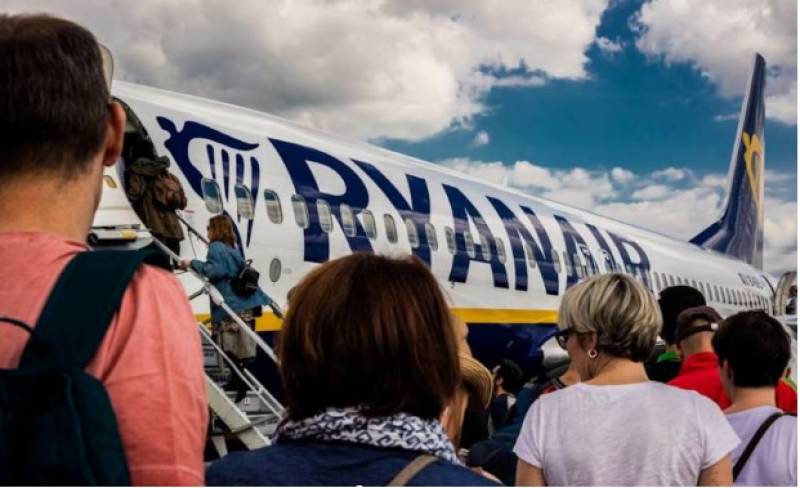
It's been quite the week for Ryanair news, and most of it won’t have passengers rushing to grab their passports. The Irish budget airline has been making waves on two fronts, first with their dramatic exit from several Spanish airports and now with a cheeky new way to squeeze even more money out of unwary travellers.
Let's start with the big story. Just over a week ago, Ryanair dropped what can only be described as a bombshell, announcing they'd be slashing a whopping one million seats and 36 routes across Spain this winter. Their beef? What they're calling "excessive and uncompetitive" charges from Aena, Spain's airport operator.
The upshot is that Ryanair is permanently pulling out of Vigo, Santiago and Valladolid, while also scaling back operations at Tenerife North from January.
Now, if you're a regular Ryanair user from any of these airports, you might have been panicking about your travel options. But here's where the story gets interesting.
Other airlines have been circling like vultures, ready to swoop in and grab those abandoned routes faster than you can say "boarding pass."
Transport Minister Óscar Puente probably put it best when he quoted that old phrase, "The king is dead, long live the king."
Within days of Ryanair's announcement, Vueling, Iberia Express, Binter and even Hungarian carrier Wizz Air were all announcing new or expanded services, particularly targeting the Canary Islands and Galicia.
Minister Puente was pretty clear about where the government stands on all this.
"What won't happen in this country, at least not while we're in government or I'm Minister of Transport, is that any company will be able to change our country's airport and tourism policy through blackmail," he declared. Fair enough.
Airport employees now earn €2.50 every time they flag a non-compliant bag, up from the previous €1.50. Even better for them, they've scrapped the monthly €80 cap, so the more rule-breakers they catch, the bigger their bonus.
Michael O'Leary, Ryanair's famously outspoken boss, is quite open about what they're trying to achieve.
"We want our ground handling staff to detect those who try to circumvent the rules," he explained. The idea, he says, is to make sure everyone plays fair without penalising passengers who actually follow the baggage policy.
According to O'Leary, 99.9% of passengers already stick to the rules, with only about 200 travellers per year getting caught trying to push their luck. For the ground staff though, those 200 non-compliant bags could add up to a nice little bonus at the end of each month.
Something shady

Here's one for the ‘you learn something new every day’ file. Those ultra-dark sunglasses that make you look like a movie star might also make you €200 poorer if Spain's traffic police catch you wearing them while driving.
The DGT has been reminding drivers that there's such a thing as too much of a good thing when it comes to tinted lenses.
The problem lies with Category 4 sunglasses, the seriously dark ones that block up to 98% of sunlight. While they're fantastic for the beach, they're not so great for driving.
Think about it: they're perfect on a sun-drenched coastal road, but what happens when you hit a tunnel or drive through shade? Suddenly those super-dark lenses are making it harder to see hazards. Spain's Traffic Law requires drivers to have a clear, unobstructed view of the road at all times.
Traffic experts recommend sticking to Category 2 or 3 sunglasses instead, which offer solid sun protection without turning you into a mole person in lower light conditions. Look for the CE mark on the arm, which means they meet European safety standards.
And if you wear prescription glasses, remember you need to wear them while driving too, whether that's prescription sunglasses or your regular specs underneath.
Find all the latest motoring and travel news here or join our Driving in Spain Facebook group for regular updates
Murcia
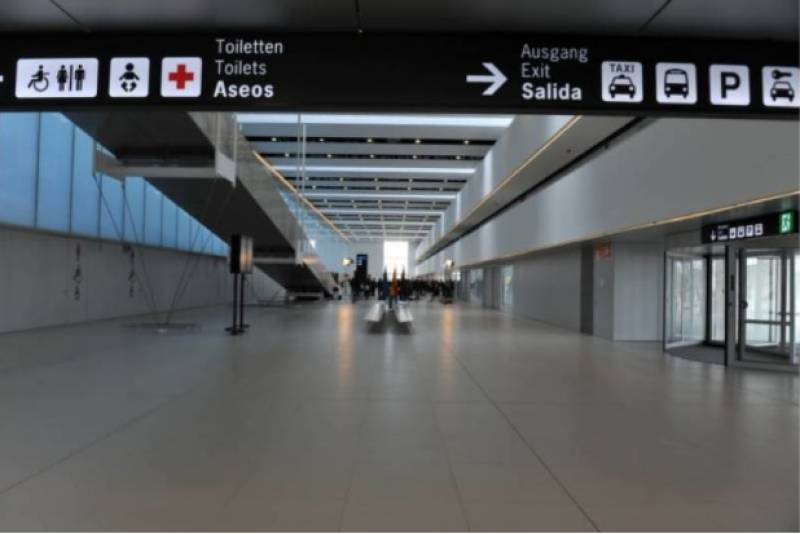
The bills keep piling up at Corvera Airport, and the timing couldn’t be worse given the passenger numbers are still crawling along rather than soaring.
The latest shocker is the electricity bill, which will set the Region of Murcia International Airport back
around €900,000 every year.
Add in rising maintenance costs, which Aena says will soak up another €73 million until 2043, and it’s easy to see why frustrations are mounting. Passenger forecasts have been slashed, revenue projections are down almost 40% and the airport still hasn’t recovered its 2019 traffic levels.
Aena doesn’t expect things to look anything like normal until 2027. In the meantime, whether it’s buzzing or empty, the bills arrive just the same.
What’s driving it? Prosecutors say many people still think throwing up a house without a licence will just mean a fine. In reality, they could face criminal charges and even suspended prison sentences, not to mention an order to tear it all down.
The trouble is, getting demolitions enforced is another battle altogether. Delays, paperwork and reluctant councils mean many owners simply leave their unlawful properties standing.
Murcia city council tops the list for reporting cases and operations have been carried out in places like Águilas, Lorca and Molina de Segura.
Despite the rising number of investigations, prosecutors warn that unless demolition orders are carried out faster, the problem will keep growing.
This time it’s not an accident but planned works, with €3.5 million being spent to install new lighting and safety systems. The Ministry of Transport says the upgrades, funded by the EU’s recovery fund, will make the tunnel safer and more energy efficient in the long run, but in the meantime, motorists are being shunted onto the parallel N-332.
Anyone who drives that stretch knows how busy it can get, so the next couple of weeks are unlikely to be much fun behind the wheel. The closures are due to end on September 23, so at least there’s a clear finish line in sight.
As if traffic disruption wasn’t enough, the Region is also bracing for another round of heavy autumn rain. The regional government has announced
€14 million worth of new flood protection projects across several municipalities, from San Javier to Las Torres de Cotillas.
These include everything from new storm tanks and sustainable drainage systems to floodable parks designed to absorb excess water. A few of the projects are already well underway, like the drainage system in Lorquí, while others are still at the planning stage.
Restoring ravines to hold more water is also part of the plan, with €2.5 million set aside for work in Cartagena.
Officials insist that these investments are crucial if communities are to be better prepared for the kind of torrential downpours that can arrive with little warning and cause chaos in a matter of hours.
At the same time, maintenance work is tipping away on existing flood defences, with the Segura Hydrographic Confederation clearing canals and removing vegetation around the Mar Menor to reduce the risk of flooding.
Los Alcázares has been hit particularly hard in past years, so extra attention is being paid to the drainage canal which diverts water away from the town.
And speaking of Los Alcázares, preparations are already in full swing for one of the town’s most cherished celebrations. The
Día del Caldero returns to the beach on October 12, filling the Mar Menor’s shoreline with the smell of simmering rice, the clatter of cooking pots and the chatter of families and friends gathering for the fiesta.
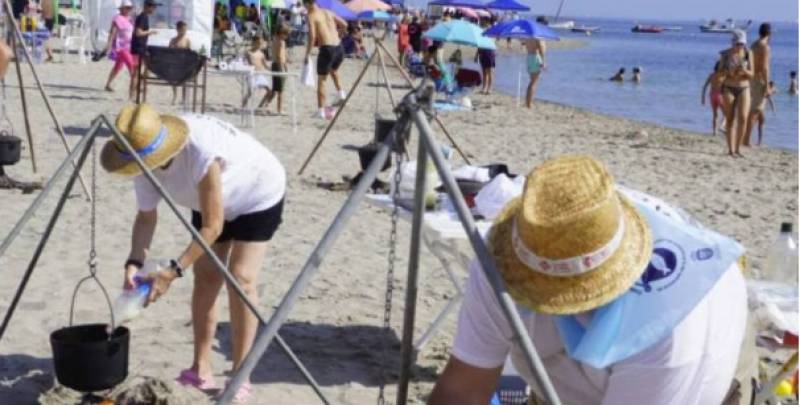
Groups, or peñas, who want to take part can now register at the Town Hall’s Festejos office or download the forms online. Don’t forget to bring ID when you hand the paperwork in, and make sure you do it before the deadline of September 29.
For anyone new to the tradition, Día del Caldero is more than just a chance to cook and eat outdoors, it’s one of those classic Murcian celebrations where the food, the sea and the community spirit all come together in one very lively package.
See our EVENTS DIARY for more events and activities coming up soon in the Region of Murcia:
Spain

Spain is holding true to its promise to get a lot tougher on smoking. The government has pushed through a new bill that doesn’t just ban sales to under-18s, but makes it illegal for minors to smoke at all. If they’re caught lighting up, their parents could be fined up to €100.
The legislation will treat e-cigarettes, vapes, shishas and nicotine pouches in the same way as traditional cigarettes, leaving no loopholes for alternative products.
Advertising is also being targeted, with all forms of promotion and sponsorship set to be prohibited whether online, in bars or at events. Penalties could reach as high as €600,000.
The government also plans to eliminate single-use vapes, citing both their environmental impact and their popularity among teenagers.
While the bill stops short of plain packaging or higher VAT on tobacco, it still represents one of the boldest anti-smoking moves Spain has ever considered.
Unsurprisingly,
bar and restaurant owners are strongly opposed, particularly to the terrace ban. José María Rubiales, who represents cafés and bars in Murcia, insists that the government never consulted the sector and is unfairly punishing business owners.
He argues that terraces are largely open-air spaces that do not pose a serious health threat and points to European surveys showing that most people do not consider terrace smoking a problem. Turning owners into “police officers” for their customers, he says, is simply unreasonable.
Hospitality associations across Spain have repeated these concerns, warning that the measures are disproportionate and could even harm Spain’s reputation as a tourist destination, especially with 94 million visitors expected this year.
They note that only Sweden has a total ban on terrace smoking and they argue that Spain risks becoming an outlier in Europe. Associations in Menorca and Sevilla add that owners should not be forced to explain confusing new rules to foreign visitors or to intervene in disputes at tables.
The new rules, which came into force at the end of July, apply to employees, the self-employed and civil servants alike.
Single-parent families stand to gain the most, with leave extended to 28 weeks during the baby’s first year and four of those weeks fully paid. This brings their total to 32 weeks of paid time off. Labour Minister Yolanda Díaz described the reform as a cultural shift that could support around a million people in its first year.
Critics are not entirely satisfied, however. Some coalition partners dismiss the extension as insufficient, saying it falls short of the 20 weeks they had pushed for. Others accuse the government of rushing the reform to avoid hefty EU fines, which could have cost Spain €40,000 per day for failing to comply with European law.
Even so, the changes represent progress, though not the leap forward many were hoping for.
Debate over working hours has also taken centre stage. For months, Minister for Labour Yolanda Díaz has promoted a reduction to 37.5 hours per week, promising shorter weeks without pay cuts.
That plan suffered a major setback this week though when Junts, the PP and Vox all voted against it, leaving the proposal blocked for now.

The impact would have been substantial, with around 12.4 million workers set to benefit, particularly in industries such as retail, hospitality and construction where hours are long. The reduction would have amounted to an average of 48 minutes per week nationwide, with some sectors seeing cuts of more than 4%.
Employers’ groups have opposed the plan from the beginning, warning of billions in extra costs for businesses, especially small and medium-sized firms.
Spain remains broadly in line with its European neighbours, with an average full-time week of 38.9 hours, similar to Germany and Italy and only slightly higher than France.
But the Labour Minister is far from giving up. While she feels the veto is a “slap in the face”, Ms Díaz is adamant that the change is something most ordinary working people want.
She insisted that even though the reduction in working hours hasn’t happened today, "it will happen tomorrow," because it's a measure that has already been "won" in the streets. "Today we will lose the vote, but tomorrow this debate will move forward," Ms Díaz said.
Alicante
It seems there is no end to the number of ways we can be unwittingly conned out of our money on the internet.
Victims in 19 provinces, including Murcia, Alicante and Andalucía, found this out to their cost when they made payments on what looked like the website of a well-known, multi-national telecommunications company.
Unfortunately, this website turned out to be a fake which had been cloned by a couple of fraudsters, who used the victims’ information to create virtual bank cards.
These cards were then used to make purchases in various stores in the Vega Baja del Segura area.
Officers identified the alleged criminals as a couple living in Torrevieja.
After weeks of surveillance and monitoring, investigators arrested the suspects at their home, which officers described as a "fraud operations centre", full of mobile phones, SIM cards, laptop computers, cryptocurrency wallets, and anonymous prepaid bank cards.
So far, police have identified 30 counts of fraud amounting to approximately €20,000.
They also confirmed the use of 13 payment cards issued in various other countries, suggesting there may be more victims abroad.
A Torrevieja court has jailed the man on remand and released the woman on charges, but the investigation remains open and more victims may be identified.
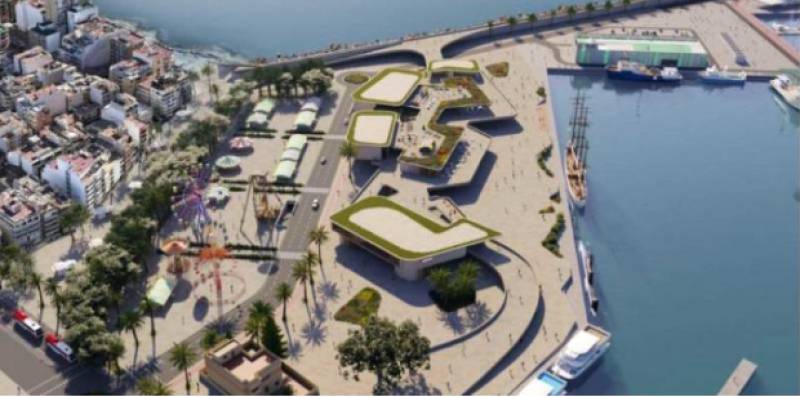 If there is one thing that frustrates residents and visitors alike in Torrevieja, it is the difficulty of finding a parking space.
If there is one thing that frustrates residents and visitors alike in Torrevieja, it is the difficulty of finding a parking space.
It is a choice between driving around for ages hoping that a place on the street might appear, and paying through the nose for a car park.
Thankfully, Torrevieja council and concessionary company Telpark have cooked up a deal which enables drivers to use the Paseo del Mar car parks for up to 12 hours for just 99 cents.
The campaign runs from September 8 until September 30, with no restrictions on days or times.
Drivers need to buy passes through the Telpark app in bundles of 5, 10 or 20.
The car park system reads the vehicle’s number plate on entry and exit, meaning no more tickets or manual payments, and users can switch their registered number plate if they change cars.
Moreover, anyone who purchases a pass will receive a 30% discount on electric vehicle charging until December 31 in any Telpark car park in Spain.
It also seems there is no end to the number of Brits who insist on getting drunk and causing trouble on airplanes, aggravating and intimidating fellow passengers and cabin crew alike.
Airlines are sick and tired of this sort of behaviour and nowadays have no compunction about taking action to ensure that louts like these pay for the disruption they cause, and will hopefully think twice before doing it again.
The latest example of this embarrassing national pastime was a pair of guys flying to Alicante airport on a stag-do.
Although other passengers said the men seemed to be drunk before they boarded the flight from Leeds-Bradford, they were assessed by airport security and deemed to be fit to fly.
However, they became disruptive towards the end of the flight and one passenger, who claimed the pair were acting “rowdy and lairy” and annoying everybody else, described the situation as “carnage”.
Fed up cabin crew called ahead for police assistance when they touched down, and other passengers cheered as Guardia Civil officers hauled the offenders off the plane.
Ryanair has repeatedly called for European authorities to limit passengers at airports to two alcoholic drinks, in order to ensure safer and better behaviour on board but no such restriction has been implemented, yet.
And finally, there is a great opportunity to combine fitness with self-defence at the Martial Arts Beach Festival in Orihuela Costa this Saturday September 13.
The free event, organised with BMF Martial Arts School, offers classes for all ages and skill levels throughout the morning from 9.30am until 2pm.
You can join in or just watch the skills and techniques on display while you enjoy the sounds provided by a DJ from 11am and live music at the end.
The schedule starts with yoga to warm up at 9.30am, followed by kickboxing for children and younger people at 10.30am.
Self-defence classes for mixed ages begin at 11.15am, and there are boxing classes at 12.30pm, both of which are suitable for newcomers and more experienced practitioners alike.
The final session at 1.15pm teaches the basics of Muay Thai, which combines punches, kicks, elbows and knees.
Registration is simple through the online form at https://forms.gle/jkorWCVRi15unhdL9
Andalucía
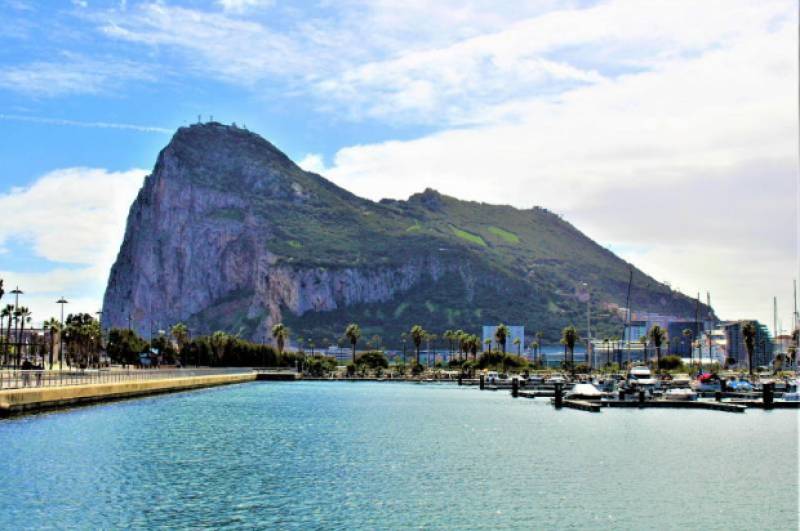
A big step forward in UK-Spain relations has recently grabbed the headlines. Spanish President Pedro Sánchez jetted over to London on Wednesday September 3 to meet UK Prime Minister Keir Starmer. The leaders toasted what Sánchez called a “fundamental agreement” on Gibraltar, signing a wide-ranging deal that could finally blow the border barriers away.
If all goes smoothly, the physical fence between La Línea and the Rock may be torn down as soon as January, ending those daily border checks for travellers and goods. A real game-changer that should make life a lot easier for locals on both sides and give trade a healthy boost.
But that’s not all. The new pact goes beyond Gibraltar too, setting up a joint economic forum and promising strengthened cooperation in everything from climate and security to culture and transport. Sánchez described the visit as “very important for the Spanish government and people,” while Starmer called it a “strategic bilateral framework” to refocus ties post-Brexit.
Moving from diplomacy to environmental vigilance, Andalucía is also keeping a close eye on wildlife health as avian flu spreads its wings wider. The regional government has raised the alert following fresh outbreaks in the Doñana natural park, with new cases popping up in Seville’s Aznalcázar and Huelva’s Hinojos affecting wild ducks.
This follows earlier reports of bird deaths in Seville and Malaga parks, plus a poultry farm in Huelva. The Environment Ministry has cranked up to Level 2 of its prevention protocol, meaning boots on the ground are working hard to safely remove dead birds, care for sick threatened species in recovery centres, and keep a hawk’s eye on the situation.
In Seville, worries grew when three peacocks were found dead near a nursery school. Precautions are in place, keeping children from outside play until test results are in. Health authorities, meanwhile, have urged calm, saying it’s “very unlikely” the virus could jump to humans, with no positive tests so far. It’s a careful balancing act between protecting wildlife and safeguarding public health amid ongoing challenges in natural reserves.
As if that wasn’t enough to keep people on their toes, the West Nile virus has made a comeback in Andalucía. First spotted in Menorca, infected mosquitoes have now been caught in several high-risk areas including Seville, as well as Huelva and Málaga.
Authorities have put nearly 200 mosquito traps in place to monitor the situation. The Junta de Andalucía’s tough anti-virus action plan now ranks 108 municipalities in the region as high risk.
So far, no human cases have been confirmed, with hundreds tested all coming back negative. Locals and visitors alike are urged to use insect repellent, avoid being outdoors at dawn and dusk, and eliminate standing water to keep mosquito breeding under control. With one of the busiest mosquito seasons in years, staying alert and taking precautions is top of the agenda.
Rounding things off with some not-so-great news for travellers, rail services between Madrid and Andalucía hit a bump on Tuesday afternoon. A fire near Ciudad Real forced a shutdown of the high-speed line for just over an hour from around 4pm, with emergency services called in to tackle the flames.
This latest snafu adds to a chorus of complaints over summer’s technical glitches and delays from passengers fed up with unreliable service. Renfe and Adif are under pressure to get their act together with clearer plans and better crisis handling.

You may have missed…
- The mortgage hurdle forcing thousands to rent amid soaring house prices
Becoming a homeowner in Spain remains a distant dream for millions, but it's not just about house prices continuing their rapid climb. The main obstacle? The hefty savings needed for a mortgage deposit that pushes many potential buyers towards renting instead.
- British couple in southern Spain say the “cost of living has gone up, but it’s still cheap”
More than 130,000 British nationals over 60 now call Spain home, with most settling along the Mediterranean coast in places like Málaga and Alicante. Among them are Mal and Bill Netley, a retired couple who chose to live in El Albir, Alicante, share their experience.
- Opposition to Mazarrón Biogas plant escalates to legal action
What started as a wave of signatures on a petition against the planned biogas plant in Mazarrón is now moving toward the courts. With the project proposed less than a kilometre from the boundary of the Camposol urbanisation, locals say enough is enough.
- Foreign tourists flock to Murcia despite Spanish visitor slump
The Region of Murcia continues to attract more and more international visitors, with several key markets such as Germany and Ireland showing impressive growth, even as domestic tourism faces temporary headwinds.
- Cartagena's port sparks a new era of hospitality and regeneration
Renovation work is now underway at the port of Cartagena, marking the start of a wider transformation in the city’s heart. A key symbol of this change is the reopening of the centrally located AC Hotel Cartagena.
And that’s all we’ve got for you this week. See you again next Friday.
Happy weekend 

 Now, if you're hoping for that classic European autumn experience with crisp mornings and cosy evenings, you might want to adjust your expectations. Spain looks set for another unseasonably warm few months, particularly in the centre of the country, up north and along the Mediterranean coast.
Now, if you're hoping for that classic European autumn experience with crisp mornings and cosy evenings, you might want to adjust your expectations. Spain looks set for another unseasonably warm few months, particularly in the centre of the country, up north and along the Mediterranean coast.


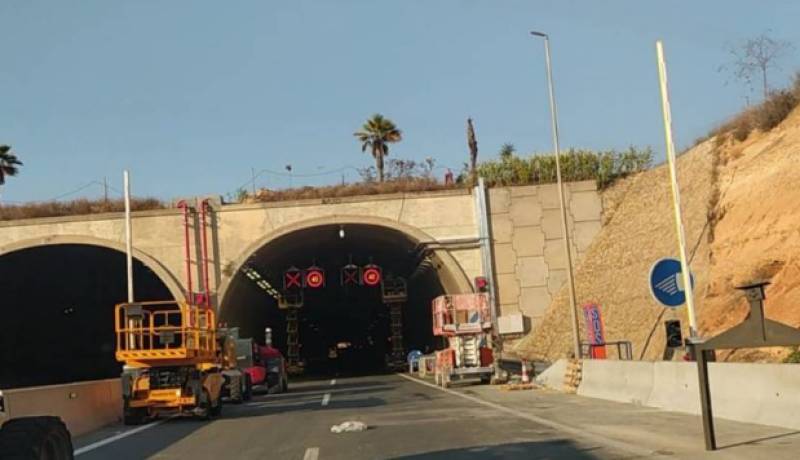 Drivers haven’t had it easy this month either. The AP-7 tunnel in Pilar de la Horadada has been shut again, only a couple of months after reopening following the fatal truck crash in May.
Drivers haven’t had it easy this month either. The AP-7 tunnel in Pilar de la Horadada has been shut again, only a couple of months after reopening following the fatal truck crash in May. Groups, or peñas, who want to take part can now register at the Town Hall’s Festejos office or download the forms online. Don’t forget to bring ID when you hand the paperwork in, and make sure you do it before the deadline of September 29.
Groups, or peñas, who want to take part can now register at the Town Hall’s Festejos office or download the forms online. Don’t forget to bring ID when you hand the paperwork in, and make sure you do it before the deadline of September 29.
 The impact would have been substantial, with around 12.4 million workers set to benefit, particularly in industries such as retail, hospitality and construction where hours are long. The reduction would have amounted to an average of 48 minutes per week nationwide, with some sectors seeing cuts of more than 4%.
The impact would have been substantial, with around 12.4 million workers set to benefit, particularly in industries such as retail, hospitality and construction where hours are long. The reduction would have amounted to an average of 48 minutes per week nationwide, with some sectors seeing cuts of more than 4%. If there is one thing that frustrates residents and visitors alike in Torrevieja, it is the difficulty of finding a parking space.
If there is one thing that frustrates residents and visitors alike in Torrevieja, it is the difficulty of finding a parking space.



















